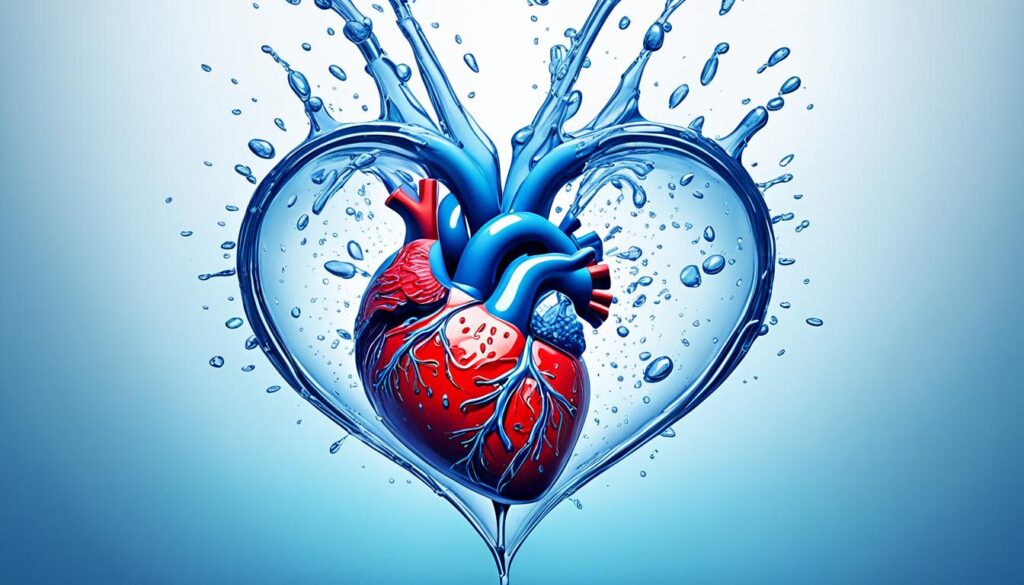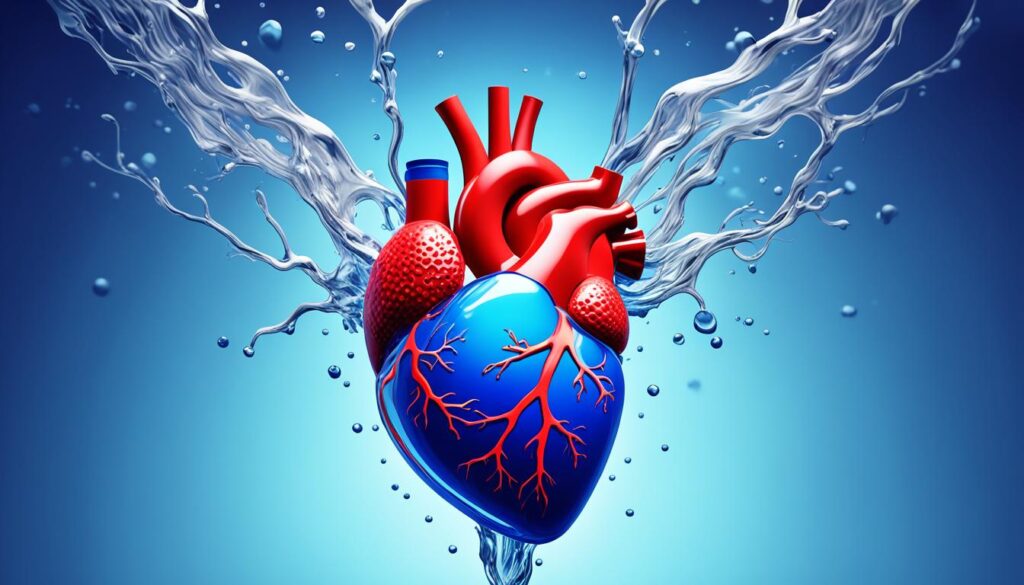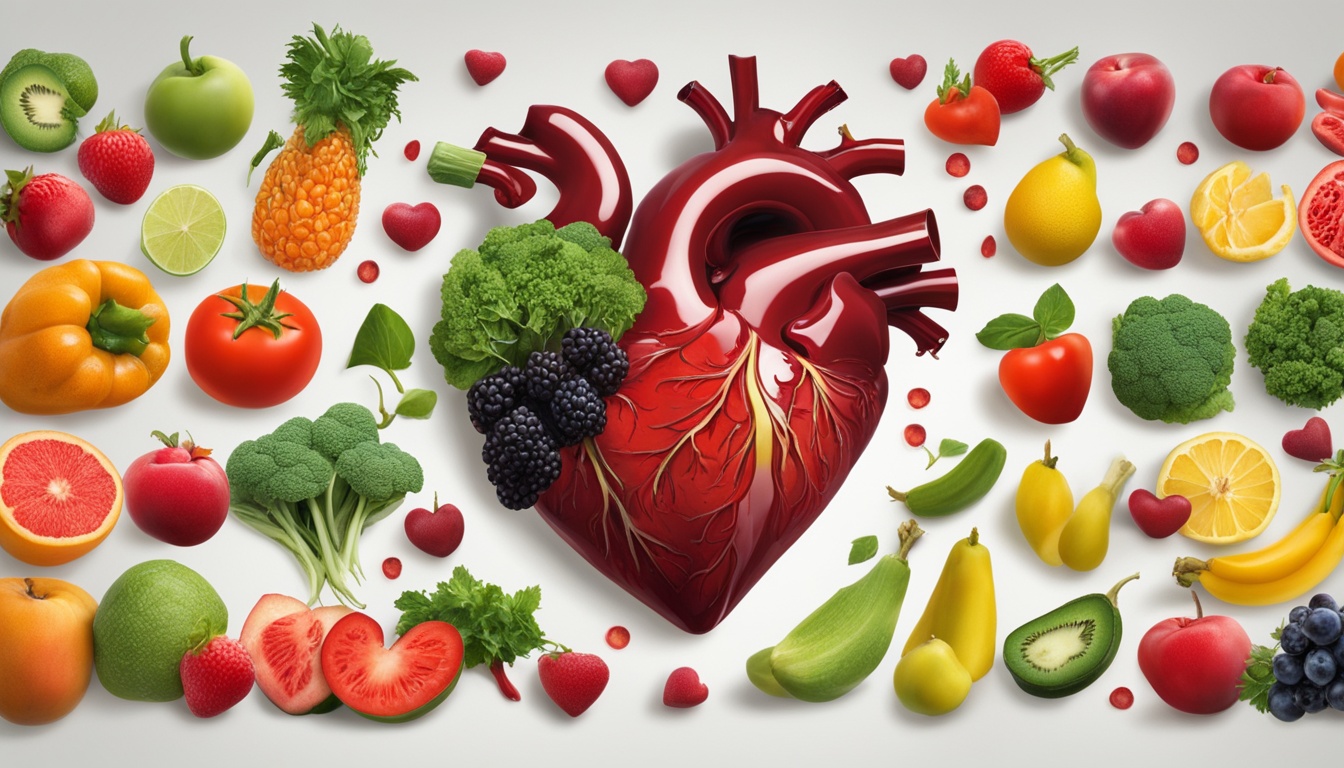Water intake and heart health are now key areas in medical studies. It’s crucial because hydration directly affects our heart’s well-being. Enough water keeps our hearts working well, influencing blood thickness and overall heart health.
Recent research has focused on how much water we drink and our heart health. Studies in the US and Germany looked at hydration markers. They also checked urine concentration in kids from hot areas to understand their hydration better. This not only shows how important water is for our hearts but also for our brains, connecting water to how well kids think.
Other studies have looked into the link between drinking water and heart conditions like high blood pressure and diabetes. They used complex math to see this connection clearly1. What they found highlights drinking enough water fights against heart illnesses.
Looking at all these studies, it’s clear that keeping hydrated is key for our heart health. This article will explore all this and more, showing why staying hydrated is great for our hearts.
Key Takeaways
- Water intake plays a crucial role in cardiovascular well-being.
- Recent studies suggest a significant link between hydration and heart health.
- Hydration levels can impact blood viscosity and the cardiovascular system.
- Elevated water intake has shown promising effects in reducing the risk of heart disease.
- Researchers recommend consistent water consumption for optimal cardiovascular health.
Overview of Hydration and Heart Health
Staying hydrated is key for our body’s health, especially our hearts. Water is more than just a drink; it’s vital for our body to work well. About 2% of Americans, or over 6.2 million people, struggle with heart failure2. Drinking enough water affects our heart rate, blood pressure, and how healthy our heart is.
Studies have found that adults with slightly high sodium in their blood are at risk. They could face chronic diseases and look older than they are, which can lead to early death3. In a study of 11,814 adults, 1,366 of them developed heart failure2. Hydrating well can lower these health risks and keep our hearts stronger.
Adults with too much sodium in their blood have a higher chance of heart failure. This risk goes up the more sodium is in your blood2. High sodium can also make us seem older than our real age. And, a very high sodium level means a much higher risk of this3.
Even a small increase in your blood sodium level raises your heart failure risk. This shows why it’s important to keep an eye on your sodium levels. To stay hydrated, women should drink 6-8 cups and men need 8-12 cups of water a day2.
Drinking enough is linked to a lower chance of heart failure, which keeps your heart strong over time2. It’s suggested that women drink 6-9 cups of fluids daily, and men need 8-12 cups3. By following these tips, you can help your heart and feel better overall.
Current Studies on Water Intake and Cardiovascular Well-being
Lastest findings highlight how key proper hydration is for heart health. New studies connect drinking water with better blood flow and lower heart disease risks. This knowledge can help us make choices that are good for our hearts.
The Role of Hydration in Blood Viscosity
Staying hydrated is vital for keeping blood thickness at the right level. If your body has too much sodium, it could mean more risks for health problems. For example, people over 142 mEq/L might have a 64% higher risk of heart issues, stroke, and atrial fibrillation4. And those over 144 mEq/L could face more aging and a greater chance of dying early5.

The Influence of Daily Water Intake on Heart Disease Risk
Research shows many people worldwide don’t drink enough water each day. The recommended amount is 6 cups for basic health. Women should drink 6-9 cups a day, and men should have 8-12 cups. These guidelines are from the National Academies of Medicine4.
Keeping your sodium levels between 138 and 140 mEq/L is best for preventing diseases5. Proper hydration can lower the chances of getting sick.
All this tells us how crucial it is to drink enough water for our hearts. It helps cut down the risks of getting heart diseases. Remembering to drink water is important for staying healthy and living longer.
Water Intake and Heart Health: New Research Discoveries
New research tells us a lot about how drinking water affects our heart health. Studies, like the Adventist Health Study, show water is key. They look at different fluids and their impact on our hearts.
Key Findings in the Adventist Health Study
The Adventist Health Study found drinking water is linked to a lower risk of dying from heart disease. This was especially true for adults aged 45-66 who didn’t have certain health issues at the beginning of the study6. Not drinking enough water can lead to heart problems too.
It’s recommended that we drink about 64 ounces of water each day to protect our hearts. Dr. Boyden and the Cleveland Clinic say avoiding salty and sugary drinks is also important for heart health67.

Comparative Analysis with Other Fluids
Not all drinks are equal when it comes to helping our hearts. Sugary beverages can actually hurt our hearts. On the other hand, water is the best choice for good heart health7. For instance, a study on young animals found that unhealthy drinks led to early heart damage7.
| Beverage | Hydration Effect | Impact on Heart Health |
|---|---|---|
| Water | Highly Hydrating | Protective against heart disease |
| Sugary Drinks | Dehydrating | Increases heart disease risk |
| Sports Drinks | Hydrating, but often high in sugars | May pose heart risks if consumed excessively |
| Coffee/Tea | Moderately Hydrating | Neutral to mildly beneficial in moderate amounts |
Areas with hard drinking water see fewer deaths from heart disease. Water’s minerals, like calcium and magnesium, seem to protect our hearts8.
Overall, water stands out as the best choice for heart health. It reduces the risk of heart disease. This makes it a crucial part of a healthy diet7.
Heart Health Benefits of Proper Hydration
Proper hydration is key for a healthy heart. The heart moves 2,000 gallons of blood each day. This underlines how important water is for the heart9. Keeping hydrated helps keep your sodium levels in check. This supports a healthy blood pressure and less strain on your heart, which could prevent heart failure1011. Plus, drinking enough water lowers the chance of dying from heart disease. People who drank five or more glasses a day were healthier than those with less than two9.
“Participants who maintained proper hydration had a notably lower incidence of heart disease, as shown in studies involving over 11,000 middle-aged adults”10.
Hydrating well can ease the heart’s work and boost blood flow. Since over 60% of your body is water, staying hydrated is vital for your heart’s health9. Enough water makes blood less thick. This means it flows easier, and your heart doesn’t have to work as hard9
Not drinking enough water is risky. It can spike your sodium levels and up the risk of heart failure. This is especially true if your sodium level goes past 142 mmol/l11. Many people don’t drink the recommended 1.6 to 2.1 liters for women and 2 to 3 liters for men daily. This puts them at a higher risk for heart problems11.
Drinking enough water is important, but so are drinks like orange juice, milk, and tea for staying hydrated10.
- Adequate hydration reduces the risk of high blood pressure by ensuring healthier serum sodium levels10.
- Hydration aids in reducing cholesterol levels, a significant risk factor for heart disease9.
- Proper fluid consumption supports kidney function, essential for regulating blood pressure9.
So, the benefits of staying hydrated for your heart are huge. Paying attention to how much you drink each day is great for your heart. It keeps you from dehydration and boosts your health overall.
The Impact of Dehydration on Cardiovascular Health
Dehydration really affects our heart, messing with blood pressure and upping the chance of strokes. It can harm the heart in the short and long term, stressing the body’s system of blood flow.
Effects of Dehydration on Blood Pressure
Being dehydrated messes with how our heart works, especially if we’re working out a lot and sweating12. It makes the heart pump less blood and our blood vessels get tighter, which can spike our blood pressure12. Dehydration also makes our arteries stiffer, another factor that can lead to high blood pressure12. Drinking enough water helps ease these issues, showing how crucial staying hydrated is.
Dehydration and Increased Risk of Stroke
If we’re not well hydrated, the flow of blood to our brain can drop during intense workouts12. But this doesn’t mean our body uses less oxygen12. Keeping hydrated helps keep our blood flow smooth, cutting the stroke risk12. Higher salt levels in the blood later in life might lead to heart problems and failure13. So, staying hydrated is key to avoiding these issues and keeping our heart strong.
Recommended Water Consumption for Optimal Heart Health
Staying hydrated is vital for your heart’s health. The U.S. National Academies of Sciences, Engineering, and Medicine advise men to drink about 15.5 cups of fluid each day. For women, they recommend 11.5 cups. This includes water, plus other drinks and foods14. Remember, 20% of your fluids usually come from what you eat14.
It’s important to know how much water to drink for your heart health. Age, how active you are, and the weather are key. Water is best, but you can also get fluids from fruits, veggies, milk, and even some coffee or tea14. While many say you should drink eight glasses each day, what you really need can change. This depends on how much you move, the weather, and if you’re sick14.
Watching out for signs you need more water is part of keeping your heart healthy. If you’re rarely thirsty and your urine is light, you’re likely okay14. But, if you’re not sure or have special health needs, don’t hesitate to talk to a health expert. They can give advice based on your own situation14.
If you don’t often feel thirsty and your urine looks clear, you’re probably getting enough water. Still, a health pro can help figure out your exact needs14.
Some situations, like working out, being in hot weather, or having a baby, can change how much water you need. Really active people need to be careful not to drink too much. This can cause a rare but serious condition called hyponatremia14. Being mindful of these points will help you keep your heart healthy with the right amount of water each day.
Remember, these tips and insights on water intake are a great guide for your heart’s health.
Hydration Tips for Maintaining a Healthy Heart
Hydration is key for a healthy heart. Our bodies, mostly water, need enough to function well. This means drinking water every day is crucial for heart health15. Drinking enough water helps avoid health issues and makes us feel better.
Incorporating Water into Daily Routine
It’s easy to include water in your day. Men and teenage boys should drink 1.8 to 3.0 liters daily. For women and teenage girls, it’s 1.6 to 2.2 liters. This is roughly 13 cups for men and 9 cups for women15. Carrying a water bottle and using reminders can keep you hydrated.
Healthy Hydration includes more than just water. Try herbal teas or soups to mix things up. These also count towards your daily fluid needs.
Recognizing Signs of Dehydration
Knowing when you’re dehydrated is very important. Dark urine and a dry mouth are signs you need more water. Chronic dehydration can cause kidney stones and heart problems15. Paying attention to these signs helps you stay hydrated and healthy.
Source Links
- Relationship Between Water Intake and Metabolic/Heart Diseases: Based on Korean National Health and Nutrition Examination Survey
- Good hydration may reduce long-term risks for heart failure
- Good hydration linked to healthy aging
- Good hydration linked to healthy aging
- Hydration can significantly impact your physical health, study finds | CNN
- Hydrate for heart health
- Drinking Water Could Help Prevent Heart Failure Years From Now
- Is drinking water hardness associated with cardiovascular disease mortality?
- Understanding the Critical Role of Hydration in Maintaining Heart Health
- Staying Hydrated Could Reduce Your Heart Disease Risk, According to New Research
- Drinking sufficient water could prevent heart failure
- Hydration Status and Cardiovascular Function
- Drinking sufficient water could prevent heart failure
- How much water do you need to stay healthy?
- Healthy Hydration: The Science and Importance of Drinking Water




